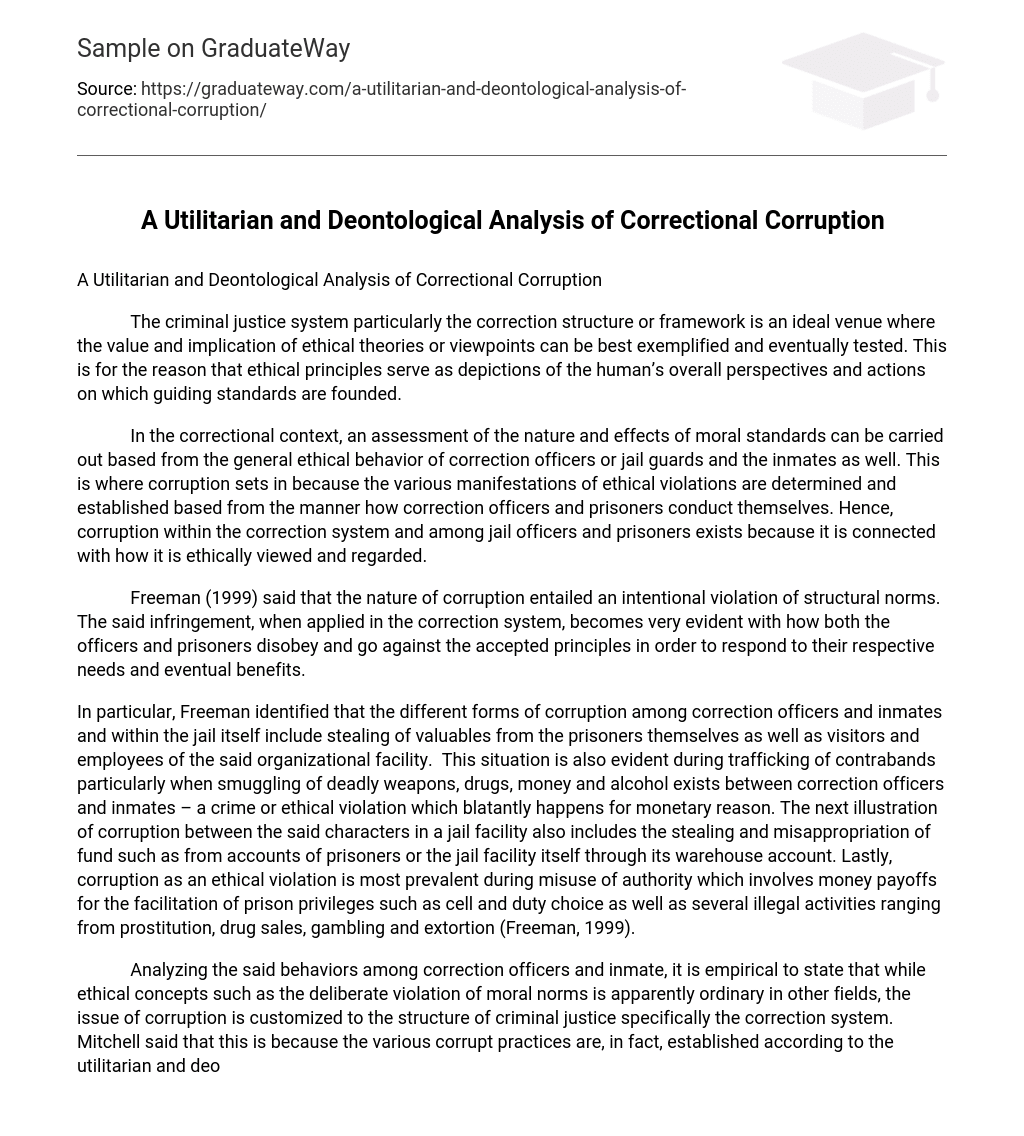The criminal justice system particularly the correction structure or framework is an ideal venue where the value and implication of ethical theories or viewpoints can be best exemplified and eventually tested. This is for the reason that ethical principles serve as depictions of the human’s overall perspectives and actions on which guiding standards are founded.
In the correctional context, an assessment of the nature and effects of moral standards can be carried out based from the general ethical behavior of correction officers or jail guards and the inmates as well. This is where corruption sets in because the various manifestations of ethical violations are determined and established based from the manner how correction officers and prisoners conduct themselves. Hence, corruption within the correction system and among jail officers and prisoners exists because it is connected with how it is ethically viewed and regarded.
Freeman (1999) said that the nature of corruption entailed an intentional violation of structural norms. The said infringement, when applied in the correction system, becomes very evident with how both the officers and prisoners disobey and go against the accepted principles in order to respond to their respective needs and eventual benefits.
In particular, Freeman identified that the different forms of corruption among correction officers and inmates and within the jail itself include stealing of valuables from the prisoners themselves as well as visitors and employees of the said organizational facility. This situation is also evident during trafficking of contrabands particularly when smuggling of deadly weapons, drugs, money and alcohol exists between correction officers and inmates – a crime or ethical violation which blatantly happens for monetary reason. The next illustration of corruption between the said characters in a jail facility also includes the stealing and misappropriation of fund such as from accounts of prisoners or the jail facility itself through its warehouse account. Lastly, corruption as an ethical violation is most prevalent during misuse of authority which involves money payoffs for the facilitation of prison privileges such as cell and duty choice as well as several illegal activities ranging from prostitution, drug sales, gambling and extortion (Freeman, 1999).
Analyzing the said behaviors among correction officers and inmate, it is empirical to state that while ethical concepts such as the deliberate violation of moral norms is apparently ordinary in other fields, the issue of corruption is customized to the structure of criminal justice specifically the correction system. Mitchell said that this is because the various corrupt practices are, in fact, established according to the utilitarian and deontological theories or viewpoints (Mitchell, 1996).
Mitchell explained that corruptions among correction officers and inmates were founded based from the ethical principle of utilitarianism which evaluates the value of an action according to its advantageous implication or how it will benefit the majority in the end. Hence, the monetary consideration or money payoff explicitly explains the valued end or rationale behind the occurrence of corruption and why said correction characters engage to such irregularities (Mitchell, 1996).
In the deontological perspective, on the other hand, corruption between jail officers and prisoners is founded by an apparently incorrect understanding of duty performance. This is because since the ethical theory of deontology considers that in the performance of duties, people are susceptible to commit illegal actions such as corruption regardless of its effects. These motive and consequence factors, therefore, establish the difference between utilitarian and deontological ethical views. Hence, the immoral valued implication of the money-motivated corruption specifically determines that the utilitarian ethical view best explains the rationale behind the apparent immoral conduct of corruption among correction officers and inmates.
References
Freeman, R.M. (1999). Correctional Organization and Management: Public Policy Challenges, Behavior, and Structure. USA: Elsevier.
Mitchell, C. (1996). Issues in Criminal Justice Systems [HTML Version]. Retrieved from AJComp Worksheets Web site: http://leo.riohondo.edu/AJComp%20Worksheets/welcome_to_aj250.htm





